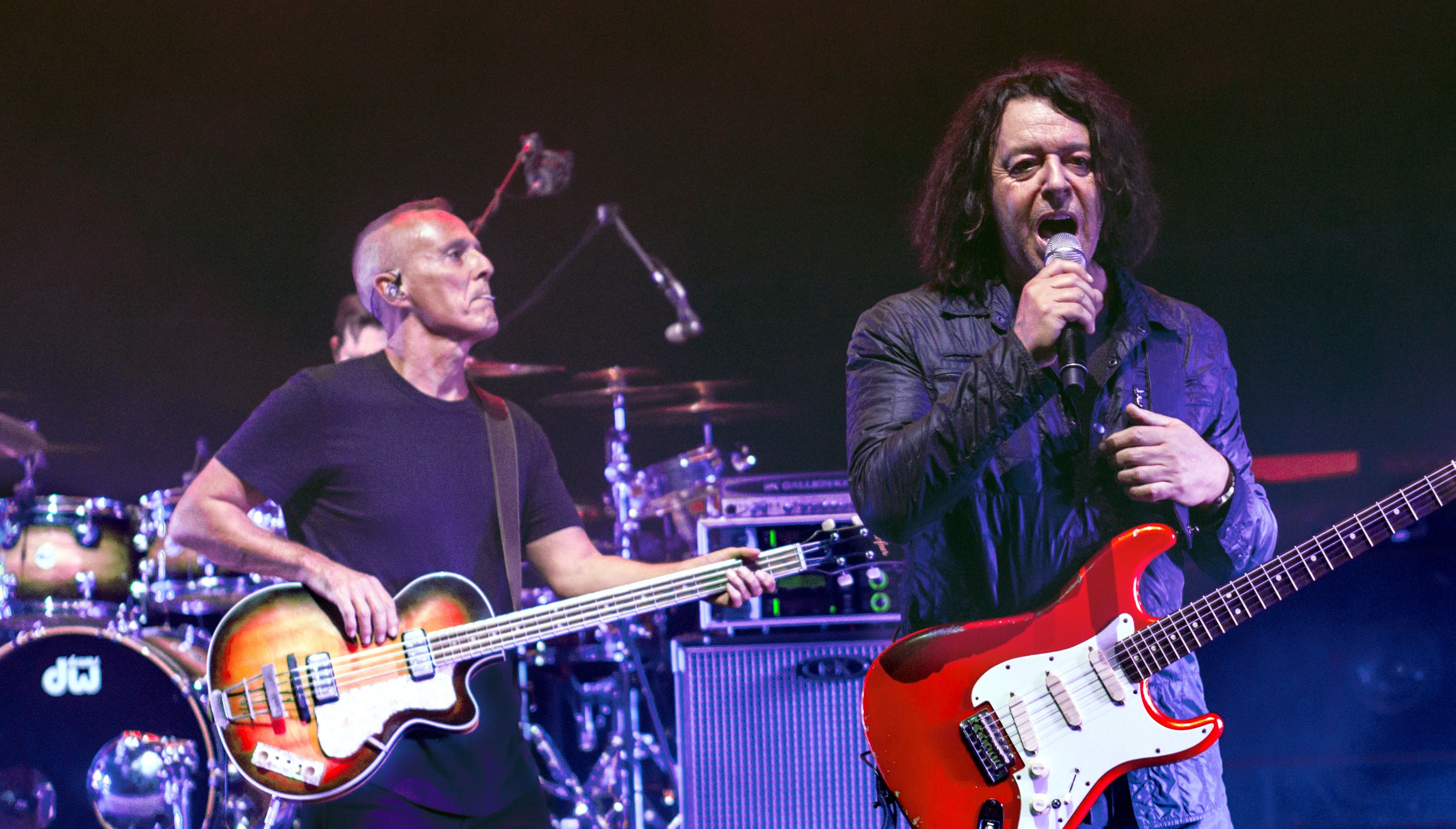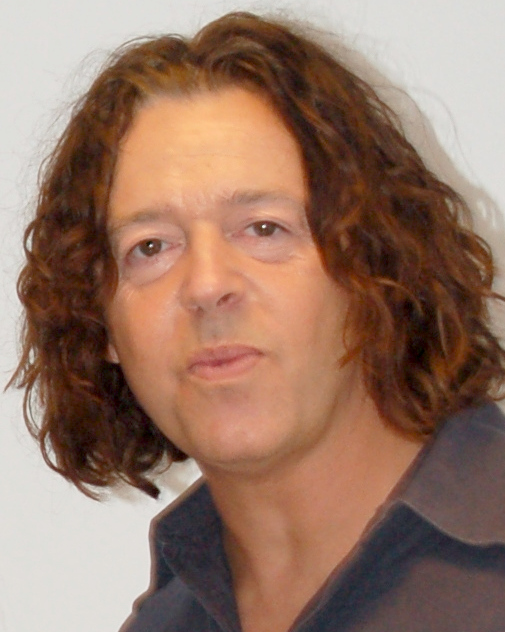1. Overview
Roland Jaime Orzábal De La Quintana (born August 22, 1961) is an English musician, singer-songwriter, record producer, and author, best known as a co-founder, main songwriter, guitarist, co-lead vocalist, and the only constant member of the iconic band Tears for Fears. His distinctive wide-ranging baritone voice, which includes a notable falsetto, alongside his contributions on keyboards and guitar, has been central to the band's enduring sound. Beyond his work with Tears for Fears, Orzabal has also gained recognition as a producer, notably for artists like Oleta Adams, and as a prolific songwriter, earning multiple Ivor Novello Awards. In 2014, he expanded his creative endeavors by publishing his first novel, a romantic comedy. This article details Orzabal's formative years, his significant musical achievements with Tears for Fears and through solo projects, his contributions as a producer and songwriter for other artists, and his ventures into literature, all while exploring the influences and personal experiences that have shaped his diverse career.
2. Early Life
Roland Orzabal's early life laid the foundation for his future musical and artistic pursuits, marked by family heritage, a significant name change, and early exposure to music and performance.
2.1. Birth and Family Background
Orzabal was born in Portsmouth, Hampshire, England, on August 22, 1961. He was initially raised in nearby Havant. His father, George Orzabal de la Quintana, was a Frenchman of Argentinian and Basque/Spanish roots, who had moved to England from Paris. His mother was British. Though his father was often ill and rarely seen by his children, his relationship with Roland would later attract public attention. Originally named RaoulRa-OOLFrench at birth, his parents changed his name to Roland at two weeks old to give him a more English-sounding name upon their relocation to the United Kingdom.
2.2. Childhood and Early Musical Interests
Orzabal's engagement with music began at a remarkably young age; he wrote his first songs when he was just seven years old, demonstrating an early aptitude for composition that would define his future career.
2.3. Education
The family later moved to Bath, Somerset, where Orzabal attended Culverhay School, which was later renamed Bath Community Academy. During his formative years, he also became an active member of the Zenith Youth Theatre Company, an experience that likely honed his performance skills and stage presence.
3. Music Career
Roland Orzabal's music career is defined by his pivotal role in Tears for Fears, a band that achieved global success, as well as his ventures into solo work and various collaborative projects.
3.1. Early Band Formations and Tears for Fears
Orzabal's musical journey began in his early teens in Bath, where he first met Curt Smith. In the late 1970s, they joined forces with three other musicians to form a mod music group called Graduate, which also incorporated elements of ska music. After releasing their debut album, Acting My Age, the group disbanded. Orzabal and Smith then briefly joined another band named Neon, which released singles such as "Making Waves" / "Me I See In You" in 1980 and "Communication Without Sound" in 1981. Following these early experiences, Orzabal and Smith formed Tears for Fears, a new wave/synth-pop outfit. The band's artistic direction was profoundly inspired by the writings of the American psychologist Arthur Janov, particularly his primal scream therapy. In Tears for Fears, Orzabal serves as the main songwriter, plays guitar and keyboards, and is a prominent co-lead vocalist, sharing duties with Smith, who plays bass guitar and also sings.
3.2. Tears for Fears' Breakthrough and Activities (1980s-1990s)
Tears for Fears quickly rose to prominence, achieving significant commercial and critical success. The band's debut album, The Hurting, released in 1983, immediately topped the UK Albums Chart. Their second album, Songs from the Big Chair (1985), solidified their international fame, reaching number one on the US Billboard 200 and earning multi-platinum status in both the UK and the US. This album featured two number-one hits on the Billboard Hot 100: "Shout" and "Everybody Wants to Rule the World".

After the release of their critically acclaimed third album, The Seeds of Love in 1989, creative differences led to a split between Orzabal and Smith in 1991. Orzabal, however, continued to record and release music under the Tears for Fears name. During this period, he released two albums: Elemental in 1993 and Raoul and the Kings of Spain in 1995. While these albums did not achieve the same massive commercial success as their predecessors, they garnered high artistic evaluations and are often considered de facto solo works by Orzabal, showcasing his continued artistic vision.
3.3. Tears for Fears Reunion and Later Activities
After a hiatus, Orzabal and Smith eventually reconciled and reunited as Tears for Fears. Their reunion culminated in the release of the album Everybody Loves a Happy Ending in 2004. Following this, the band embarked on a long development period for their next album, which finally saw release in February 2022 as The Tipping Point. The band continued to release new material, with Songs for a Nervous Planet following in 2024.

3.4. Solo Projects and Other Musical Collaborations
Beyond his primary role in Tears for Fears, Roland Orzabal has explored various solo and collaborative musical endeavors. In 2001, he released his first solo album under his own name, titled Tomcats Screaming Outside.
In 1991, Orzabal was involved in the project Johnny Panic and The Bible of Dreams, which released a single of the same name. This track was a remix-heavy composition incorporating elements from Tears for Fears' songs "Shout" and "The Seeds of Love." It initially appeared as a B-side on the Tears for Fears single "Advice for the Young at Heart" and was later included on the Tears for Fears album Saturnine, indicating its close ties to the band's work rather than being a purely independent solo venture.
Orzabal also collaborated with Ian Stanley, a former Tears for Fears associate, on the project Mancrab. As part of Mancrab, they released the single "Fish for Life" in 1986, which was featured on the soundtrack for the film The Karate Kid Part II. Additionally, Orzabal has contributed to the albums of other musicians who were part of Tears for Fears' touring band, including Nicky Holland, Gail Ann Dorsey, and Michael Wainwright, further diversifying his musical contributions outside of the main Tears for Fears discography.
4. Work as a Producer and Songwriter
Roland Orzabal's talents extend beyond his own performances and songwriting for Tears for Fears, making significant contributions as a producer and songwriter for other artists.

Orzabal is a highly acclaimed songwriter, having received the prestigious Ivor Novello Award three times. His first award came in 1986 for "Songwriter of the Year," following the immense success of Tears for Fears' second album, Songs from the Big Chair. He would later win a second Ivor Novello Award in 2004 for his song "Mad World" as the Best Selling UK Single of 2003, acknowledging the resurgence of the song's popularity through a cover version. In September 2021, Orzabal, alongside Curt Smith, received their third Ivor Novello Award for "Outstanding Song Collection" by Tears for Fears, celebrating their lasting impact on music.
A significant highlight of his career as a producer came with the discovery of pianist and vocalist Oleta Adams. Orzabal and Smith were instrumental in bringing Adams into the spotlight, inviting her to collaborate on Tears for Fears' 1989 album, The Seeds of Love. Adams featured on several tracks, most notably on the hit single "Woman in Chains", performing it as a duet with Orzabal. Following this successful collaboration, Orzabal co-produced Adams' breakout album, Circle of One (1990), alongside Dave Bascombe. The album was a major success, reaching number one in the UK and number 20 in the US, and it spawned her transatlantic top ten hit "Get Here". Orzabal also co-wrote the album's lead track, "Rhythm of Life," with Nicky Holland, a song originally intended for The Seeds of Love. He further contributed by playing guitar and singing backing vocals on the track and appeared in its accompanying promotional video.
In 1999, Orzabal further demonstrated his production versatility by co-producing Icelandic singer-songwriter Emiliana Torrini's album Love in the Time of Science, collaborating with his Tears for Fears associate, Alan Griffiths. The duo also penned two tracks for the album.
Orzabal's songwriting prowess received significant renewed recognition through the widespread success of his composition "Mad World." Originally Tears for Fears' first hit single in 1982, the song was famously covered by Michael Andrews and Gary Jules for the 2001 film soundtrack of Donnie Darko. Their rendition, released as a single in 2003, became the Christmas number-one single in the UK that year and was ultimately the year's biggest-selling single. This re-evaluation of "Mad World" underscored Orzabal's enduring talent as a songwriter.
5. Literary Works
Beyond his celebrated music career, Roland Orzabal has ventured into the world of literature, showcasing another dimension of his creative expression.
In 2014, Orzabal published his first novel, a romantic comedy titled Sex, Drugs & Opera. The book tells the story of Solomon Capri, a middle-aged pop star who is semi-retired but is offered an opportunity to participate in the reality television show Popstar to Operastar. Capri views the show as a potential path to revitalize both his flagging career and his struggling marriage. The narrative draws direct inspiration from Orzabal's own experience, as he was personally approached by the ITV show to participate, although he ultimately did not take part.
6. Personal Life
Roland Orzabal's personal life has been marked by significant relationships, family events, and a range of interests that extend beyond his professional musical pursuits.
6.1. Family and Relationships
In 1982, Roland Orzabal married Caroline Johnston, with whom he had been in a relationship since his teenage years. Caroline made notable contributions to Tears for Fears' early work; she sang the child vocal on the song "Suffer the Children" from the band's debut album The Hurting, and also created the distinctive hands artwork for the 1983 re-release of the single "Pale Shelter". Roland and Caroline Orzabal had two sons, named RaoulRa-OOLFrench and Pascal.
Tragically, Caroline Orzabal died in July 2017 at the age of 54. Her passing was attributed to alcoholism-related dementia and cirrhosis, which developed after she had been diagnosed with depression. Her death led Tears for Fears to cancel their remaining tour dates for that year. In 2020, Orzabal remarried, tying the knot with Emily Rath, a photographer and writer, in Aspen, Colorado.
Orzabal's relationship with his father also drew public attention, particularly in 1985 when Tears for Fears' popularity was at its peak. Their strained relationship was notably satirized in a humorous comic strip published by the British tabloid newspaper The Sun. This comic was later used as artwork for the cover of Tears for Fears' single "I Believe".
6.2. Political Views and Other Interests
Roland Orzabal has also held specific political leanings that have occasionally found their way into his artistic expression. Following the re-election of Margaret Thatcher in June 1987, Orzabal developed a strong interest in socialism, largely in response to what he perceived as Thatcher's stance towards the working class. These sentiments regarding Thatcherism were directly reflected in the lyrics of the Tears for Fears song "Sowing the Seeds of Love", particularly in the line: "Politician granny with your high ideals / Have you no idea how the majority feels?".
Beyond music and politics, Orzabal maintains a diverse array of intellectual interests, including psychology, photography, sociology, and astrology, demonstrating a broad curiosity about the human condition and the world around him.
7. Discography
This section provides a categorized list of Roland Orzabal's major musical releases and contributions, encompassing his solo work and collaborations with various bands and projects.
7.1. Solo Albums
- Tomcats Screaming Outside (2001)
7.2. Solo Singles
- "Low Life" (2001)
- "For The Love Of Cain" (2001)
7.3. With Graduate
- Acting My Age (1980)
7.4. With Neon
- "Making Waves" / "Me I See In You" (1980)
- "Communication Without Sound" (1981)
7.5. With Tears for Fears
- The Hurting (1983)
- Songs from the Big Chair (1985)
- The Seeds of Love (1989)
- Elemental (1993)
- Raoul and the Kings of Spain (1995)
- Everybody Loves a Happy Ending (2004)
- The Tipping Point (2022)
- Songs for a Nervous Planet (2024)
7.6. With Mancrab
- "Fish for Life" (1986)
8. Awards and Recognition
Roland Orzabal has been recognized for his significant contributions to music through several prestigious awards.
He is a three-time recipient of the Ivor Novello Award, one of the most esteemed accolades for music creation in the United Kingdom. His first award came in 1986, when he was named "Songwriter of the Year" following the massive success of Tears for Fears' second album, Songs from the Big Chair, which produced global hit singles. In 2004, Orzabal received his second Ivor Novello Award as the songwriter for the "Best Selling UK Single of 2003" for "Mad World," acknowledging the unexpected commercial success of the cover version from the Donnie Darko soundtrack. Most recently, in September 2021, Orzabal and Curt Smith were jointly honored with their third Ivor Novello Award for "Outstanding Song Collection" by Tears for Fears, celebrating their enduring body of work and its profound impact on popular music.
9. Legacy and Influence
Roland Orzabal's legacy is deeply intertwined with Tears for Fears, a band celebrated for its distinctive blend of introspective lyrics and sophisticated pop-rock arrangements. His role as the primary songwriter, lead vocalist, and guitarist has cemented his influence on popular music.
Orzabal's lyrical themes, often delving into psychology and social issues, provided a depth rarely seen in mainstream pop, influencing subsequent artists who sought to combine commercial appeal with intellectual substance. The emotional honesty and intricate compositions of Tears for Fears, particularly in albums like The Hurting and Songs from the Big Chair, set a benchmark for new wave and synth-pop, demonstrating that popular music could also be artful and thought-provoking. His songwriting, exemplified by hits like "Shout" and "Everybody Wants to Rule the World," continues to resonate globally, highlighting his ability to craft anthems that combine personal insight with universal appeal. The enduring popularity and critical re-evaluation of songs like "Mad World" further underscore the timeless quality of his compositions. Through his artistic vision and consistent exploration of complex themes, Roland Orzabal has left an indelible mark on the landscape of modern music, inspiring generations of musicians and listeners.